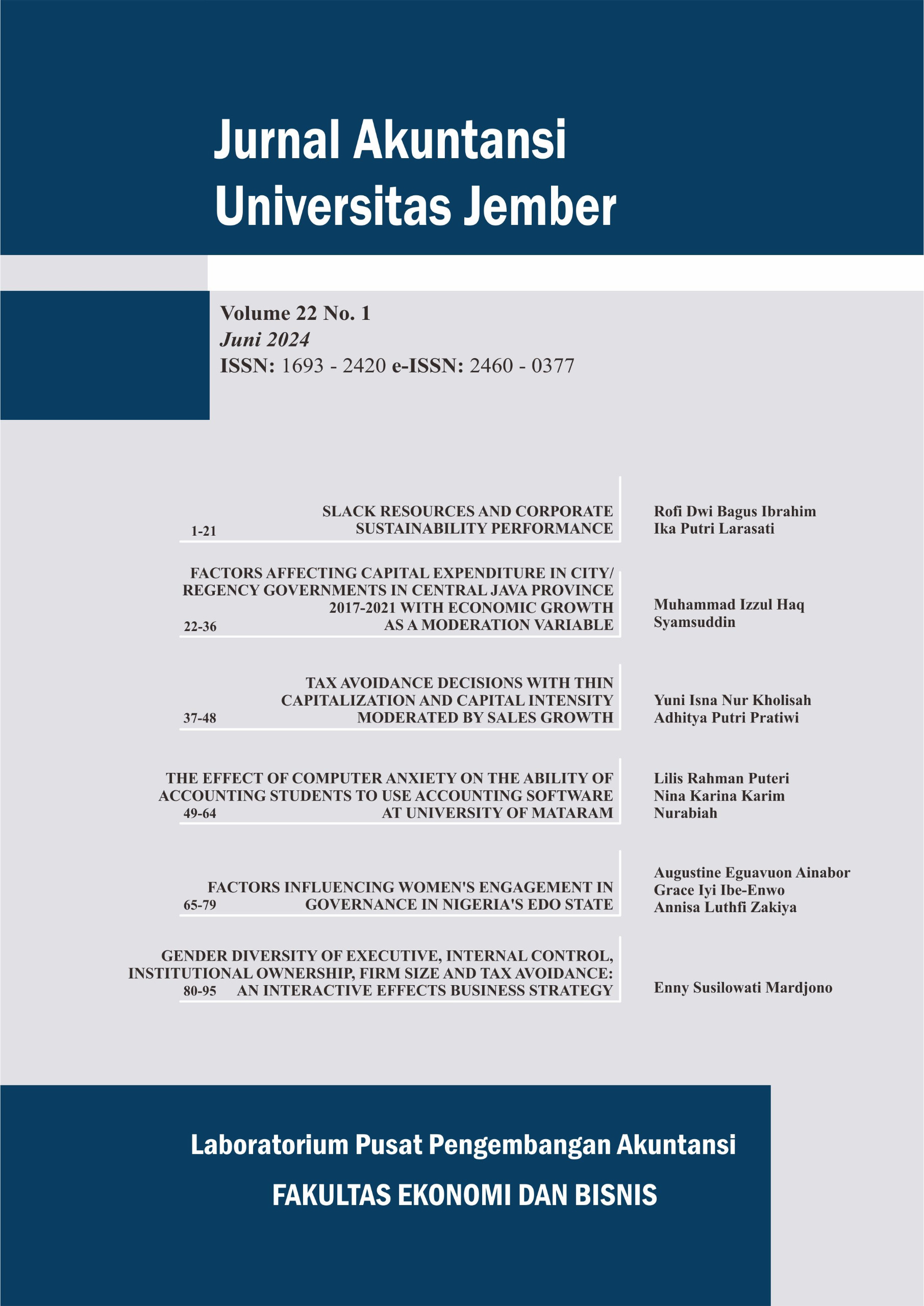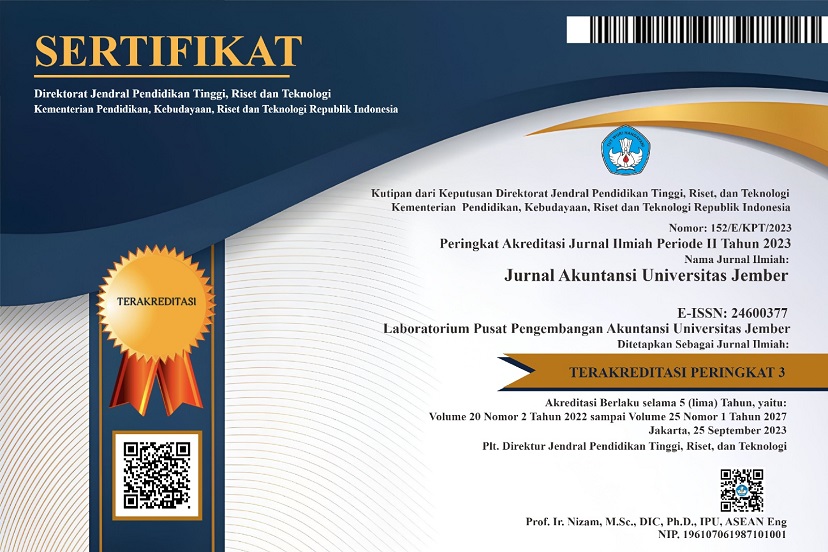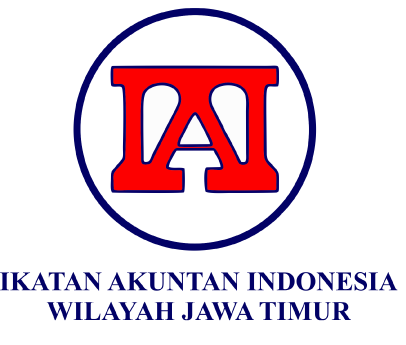THE EFFECT OF COMPUTER ANXIETY ON THE ABILITY OF ACCOUNTING STUDENTS TO USE ACCOUNTING SOFTWARE AT UNIVERSITY OF MATARAM
DOI:
https://doi.org/10.19184/jauj.v22i1.41382Keywords:
Anticipation, Computer Anxiety, Eksperimen, Fear, Software AkuntansiAbstract
ABSTRACT
The purpose of this study was to empirically test and analyze the effect of computer anxiety (fear and anticipation) on the ability of accounting students to use accounting software at the University of Mataram. The type of research used in this research is associative with a quantitative approach. The study population consisted of 267 accounting students with 34 accounting students as respondents. This study conducted hypothesis testing using experimental and observation methods through practice and questionnaires with the analytical tool used, namely IBM SPSS 25. The novelty in this study is that the method used is in the form of an experimental method to measure students' abilitiy in using accounting software. The results of the study found that the variables of fear and anticipation had no effect on the ability of accounting students to use accounting software. From the experiment it was observed that students’ ability in using accounting software was more influenced by their understanding of accounting rules, not by fear and anticipation of using the computer.
Keywords: Accounting Software; Anticipation; Computer Anxiety; Experiment; Fear
ABSTRAK
Tujuan dari penelitian ini adalah untuk menguji secara empiris dan menganalisis pengaruh computer anxiety (fear dan anticipation) terhadap kemampuan mahasiswa akuntansi dalam menggunakan software akuntansi di Universitas Mataram. Jenis penelitian yang digunakan dalam penelitian ini adalah asosiatif dengan pendekatan kuantitatif. Populasi penelitian sebanyak 267 mahasiswa akuntansi dengan jumlah responden sebanyak 34 mahasiswa akuntansi. Penelitian ini melakukan pengujian hipotesis dengan metode eksperimen dan observasi melalui kuesioner dengan alat analisis yang digunakan yaitu IBM SPSS 25. Kebaruan dalam penelitian ini yaitu metode yang digunakan berupa metode eksperimen untuk mengukur kemampuan mahasiswa dalam menggunakan software akuntansi. Hasil penelitian menyatakan bahwa variabel fear dan anticipation tidak berpengaruh terhadap kemampuan mahasiswa akuntansi dalam menggunakan software akuntansi. Kesimpulan dari penelitian ini setelah dilakukan eksperimen adalah ketakutan tidak memengaruhi kemampuan dalam menggunakan software akuntansi, tetapi kemampuan software akuntansi dipengaruhi oleh pemahaman mahasiswa dalam ilmu akuntansi.
Kata Kunci: Anticipation, Computer Anxiety, Eksperimen, Fear, Software Akuntansi
Downloads
References
Adiwibowo, L., Hurriyati, R. M., & Sari, M. Ms. (2012). Analisis Perilaku Pengguna Teknologi Informasi Pada Perguruan Tinggi Berstatus BHMN (Studi Penerapan Teknologi Informasi Pada FPEB-Universitas Pendidikan Indonesia). Bussines and Economic Journal.
Asror, A. M. (2022). Efektivitas Pembelajaran Daring Menggunakan Media Zoom dan WA Group pada Mata kuliah Islam dan Sains di Fakultas FEBI Prodi ES UIN Sunan Kalijaga Yogyakarta. Al-Tarbawi Al-Haditsah: Jurnal Pendidikan Islam, 7(1), 102–112. https://doi.org/10.31949/education.v7i3.1255
Awofala, A. O. A., Olabiyi, O. S., Awofala, A. A., Arigbabu, A. A., Fatade, A. O., & Udeani, U. N. (2019). Attitudes toward Computer, Computer Anxiety and Gender as determinants of Pre-service Science, Technology, and Mathematics Teachers’ Computer Self-efficacy. Digital Education Review, 36, 51–67. Retrieved from http://greav.ub.edu/der/
Dewi, N. K. U. K., & Juliarsa, G. (2017). Internal Locus of Control Memoderasi Computer Anxiety dan Computer Attitude pada Keahlian Aplikasi Komputer Akuntansi. Jurnal Akuntansi Universitas Udayana, 19(1), 623–653.
Effendy, A., Mitha, M. I., & Restuti, D. (2015). Pengaruh Computer Anxiety terhadap Keahlian Karyawan dalam Menggunakan Komputer. 69–79. https://doi.org/https://doi.org/10.19184/jauj.v8i2.1228
Fatmawati, E. (2015). Technology Acceptance Model (TAM) Untuk Menganalisis Penerimaan terhadap Sistem Informasi Perpustakaan. Jurnal Iqra, 9(01).
Harimurti, F., & Astuti, D. S. P. (2016). Pengaruh Computer Anxiety terhadap Keahlian Pemakai Komputer dengan Internal Locus Of Control sebagai Variabel Moderasi. Jurnal Ilmiah Akuntansi Dan Bisnis, 11(2), 91–99. https://doi.org/10.24843/jiab.2016.v11.i02.p04
Hatta, M., & Fenny, M. (2013). Kecemasan dalam Penggunaan Software Akuntansi dari Perspektif Gender dan Pengaruhnya terhadap Keahlian Pemakai dengan Locus Of Control sebagai Variabel Moderasi. Simposium Nasional Akuntansi XVI.
Heinssen, R. K., Glass, C. R., & Knight, L. A. (1987). Assessing Computer Anxiety: Development and Validation of the Computer Anxiety Rating Scale. Computers in Human Behavior, 3, 49–59. https://doi.org/https://doi.org/10.1016/0747-5632(87)90010-0
IAI. (2019). Menguasai Perubahan, Menyiapkan Masa Depan! Prakarsa, pp. 1–65.
Igbaria, M., & Parasuraman, S. (1989). A Path Analytic Study of Individual Characteristics, Computer Anxiety and Attitudes toward Microcomputers. Journal of Management, 15(3), 373–388. https://doi.org/10.1177/014920638901500302
Klibi, M. F., & Oussii, A. A. (2013). Skills and Attributes Needed for Success in Accounting Career: Do Employers’ Expectations Fit with Students’ Perceptions? Evidence from Tunisia. International Journal of Business and Management, 8(8). https://doi.org/10.5539/ijbm.v8n8p118
Kurniawan, R. (2016). Keterampilan dan Atribut yang Dibutuhkan oleh Lulusan Akuntansi untuk Sukses Berkarir: Pengujian Senjangan Persepsi Mahasiswa dan Pemberi Kerja. Jurnal Riset Akuntansi Terpadu, 9(2), 161–178. https://doi.org/http://dx.doi.org/10.35448/jrat.v9i2.4303
Lee, B., & Cranage, D. A. (2018). Causal Attributions and Overall Blame of Self-Service Technology (SST) Failure: Different from Service Failures by Employee and Policy. Journal of Hospitality Marketing and Management, 27(1), 61–84. https://doi.org/10.1080/19368623.2017.1337539
Lee, C. L., & Huang, M. K. (2014). The Influence of Computer Literacy and Computer Anxiety on Computer Self-Efficacy: the Moderating Effect of Gender. Cyberpsychology, Behavior, and Social Networking, 17(3), 172–180. https://doi.org/10.1089/cyber.2012.0029
Maharani, P. N. (2019). Pengaruh Computer Anxiety dan Computer Attitude terhadap Keahlian Pemakaian Software Akuntansi Pada Mahasiswa Jurusan Akuntansi Di Universitas Mahasaraswati Denpasar. Jurnal Sains, Akuntansi Dan Manajemen , 1(02), 236–270. https://doi.org/https://doi.org/10.1234/jasm.v1i2.40
 
Maharani, S. W., & Darmawan, A. (2020). Analisis Pola Konsumsi Masyarakat Kota Batam Berdasarkan Penggunaan E-Money Berbasis Aplikasi. Jurnal Akuntansi, Ekonomi Dan Manajemen Bisnis, 8(2), 248–262. https://doi.org/10.30871/jaemb.v8i2.2690
Nurabiah, Pusparini, H., & Fitriyah, N. (2022). Determinan Penggunaan E-Money dengan Pendekatan Model UTAUT 2 dan Risiko yang Dirasakan. Jurnal Akuntansi, 32(1), 1–20. https://doi.org/10.24843/EJA.2023.v33.i01.p14
Oribhabor, C. B. (2020). Investigating the Influence of Computer Anxiety on the Academic Performance of Junior Secondary School Students in Computer Studies in Nigeria. International Journal of Computing Sciences Research, 4(4), 370–382. https://doi.org/10.25147/ijcsr.2017.001.1.46
Piarna, R., Fathurohman, F., & Purnawan, N. N. (2020). Understanding Online Shopping Adoption: the Unified Theory of Acceptance and the Use of Technology with Perceived Risk in Millennial Consumers Context. Jurnal Ilmiah Bidang Akuntansi Dan Manajemen, 17, 51. https://dx.doi.org/10.31106/jema.v17i1.5050
Pusparini, H., Nurabiah, N., & Mariadi, Y. (2022). Analisis Content Iklan Bidang Akuntansi Persyaratan Keterampilan Akuntan. Jurnal Aplikasi Akuntansi, 7(1), 81–94. https://doi.org/10.29303/jaa.v7i1.163
Putra, A. K., & Nugroho, M. A. (2016). Pengaruh Computer Anxiety Computer Attitude Dan Computer Self Efficacy Terhadap Minat Menggunakan Software Akuntansi. Jurnal Profita, Vol. 4, No. 6.
Rahayu, S., & Zufrizal. (2019). Pengaruh Kecemasan Berkomputer dan Kemampuan Individual serta Pengaruhnya terhadap Minat Mahasiswa Akuntansi Menggunakan Software Akuntansi (pada Mahasiswa Akuntansi Fakultas Ekonomi Universitas Islam Sumatera Utara). Jurnal Riset Akuntansi Multiparadigma (JRAM), 6(1), 1–9. https://doi.org/https://doi.org/10.30743/akutansi.v6i1.1404
Schlebusch, C. L. (2018). Computer Anxiety, Computer Self-efficacy and Attitudes towards the Internet of First Year Students at a South African University of Technology. Africa Education Review, 15(3), 72–90. https://doi.org/10.1080/18146627.2017.1341291
Setyawan, R. I., & Syaefullah. (2013). Pengaruh Computer Anxiety Dan Computer Attitude Terhadap Keahlian Berkomputer Mahasiswa Akuntansi. Jurnal Ilmiah Mahasiswa, Vol. 2 No. 1.
Sultan, S., & Kanwal, F. (2017). Personal Attributes Contributing to Computer Anxiety and Computer Self-efficacy among Distance Learners. 39(1), 33–44.
Sunyoto, Y., & Ismun. (2017). Pengaruh Computer Anxiety, Technology Acceptance terhadap Computer Self-Efficacy. Simposium Nasional Akuntansi XX.
Sutanto, Ghozali, I., & Handayani, R. S. (2018). Faktor-Faktor yang Memengaruhi Penerimaan dan Penggunaan sistem Informasi Pengelolaan Keuangan Daerah (SIPKD) dalam Perspektif The Unified Theory of Acceptance and Use of Technology 2 (UTAUT 2) di Kabupaten Semarang. Jurnal Akuntansi Dan Auditing, 15(1), 37–68. https://doi.org/https://doi.org/10.14710/jaa.15.1.37-68
Sutarsih, T. (2023). Statistik Telekomunikasi Indonesia 2022 (R. Rufiadi, Ed.). Badan Pusat Statistik.
Thompson, R. L., Higgins, C. A., & Howell, J. M. (1991). Personal Computing: Toward a Conceptual Model of Utilization. MIS Quarterly, 125–143.
Venkatesh, V., Xu, Xi., & Thong, J. Y. L. (2012). Quarterly Consumer Acceptance and Use of Information Technology: Extending the Unified Theory of Acceptance and Use of Technology1. 36(01), 157–178. https://doi.org/https://doi.org/10.2307/41410412
Wardhani, A. M. N., & Ryantama, N. A. (2019). Perception Analysis of Complexity, Computer Anxiety, and Self-Efficacy of the Village Treasurer towards the Use of the SISKEUDES Application. Jurnal Dinamika Akuntansi, 11(2), 170–180. https://doi.org/10.15294/jda.v11i2.21321
Wilson, K., & Narayan, A. (2016). Relationships Among Individual Task Self-Efficacy, Self-Regulated Learning Strategy Use and Academic Performance in a Computer-Supported Collaborative Learning Environment. Educational Psychology, 36(2), 236–253. https://doi.org/10.1080/01443410.2014.926312
Yudha, C. K., & Ramantha, I. W. (2014). Pengaruh Computer Anxiety dan Computer Attitude pada Keahlian Pengguna dalam Menggunakan Komputer. Jurnal Akuntansi Universitas Udayana, 9(3), 644–657.


















